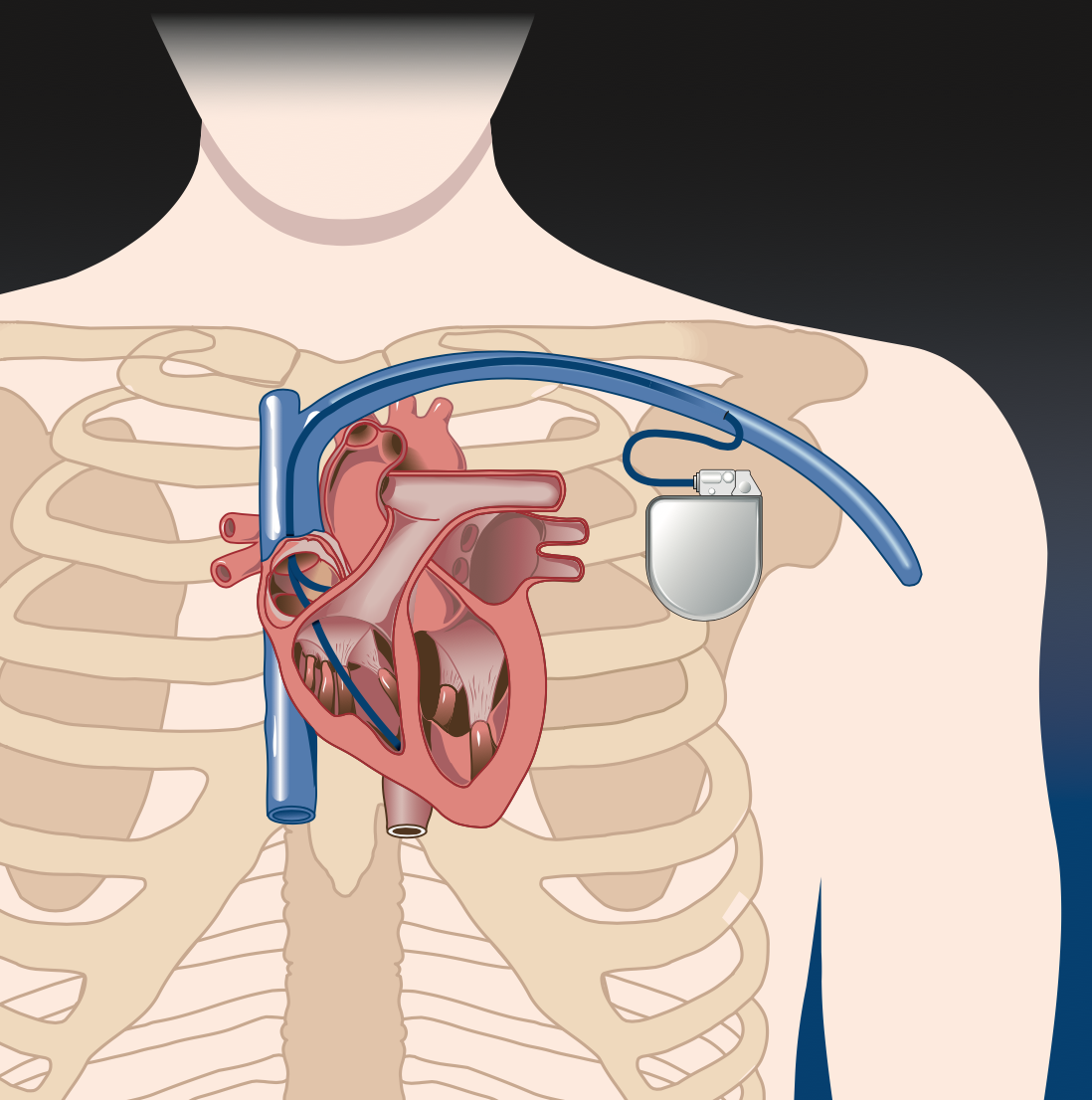Cardiac resynchronization therapy (CRT) is also called biventricular pacing. It is necessary when the electrical impulses controlling the contraction and relaxation of the heart muscle circulate slowly or irregularly in your heart. Instead of a simultaneous contraction with the right ventricle, the left ventricle can contract staggeredly, a fraction of a second later. Sometimes the parts of the left ventricle have a late contraction and the device can lead to an earlier and more uniform contraction. This lack of coordination affects the ability of the heart to pump efficiently.
The cardiac resynchronizer works both as a cardiac pacemaker and also coordinates the beating of both ventricles by stimulating them at the same time and particularly by improving the contraction of the left ventricle. The goal of this whole process is to improve the overall efficiency of the patient's heart. The cardiac resynchronizer is different from a pacemaker whose function is only to stimulate the right ventricle and control heart rate. Cardiac resynchronization devices provide relief from patient symptoms and extend life. It is not uncommon to see cardiac resynchronization associated with a defibrillator within the same device. This device is called the CRT-D.
Duration of hospital stay
2 to 3 days.
The patient will usually stay in the hospital for 2 days.
Average length of stay
1 to 2 weeks.
The doctor will have to give his/her consent before the patient returns home.

Every year, nearly 11 million patients go abroad in search of medical care. At MEDICAIM, we provide our patients with access to the best hospitals and doctors around the world. Contact us to learn more about your treatment options.
Ask for your free quote abroad
Start your medical stay by requesting a quote. Our customer service department will help you find the clinic that best suits your needs and get you a quote.
Before the procedure, the cardiologist will look for signs of poor myocardial coordination using an electrocardiogram or an echocardiographic examination (ultrasound).
The patient is fasting and has had a blood test to check the coagulation and fluidity of the blood.
The procedure is performed under local or general anesthesia.
Like pacemakers, the cardiac resynchronizer is a small metal case that weighs between 20 and 50g.
The cardiologist will make an incision about 5 centimetres long in the upper chest.
One or two probes (thin insulated wires) are guided to the heart by a vein.
The doctor connects the probes to the implanted device, checks the functioning of the device and the program.
The device is placed under your skin and the incision is closed.
The procedure usually takes about 1 to 2 hours.

After the procedure, you may experience pain or discomfort, as well as bruising at the implant site of the device. Most patients will be able to walk on the same day as the procedure and resume normal activities in 2 to 4 weeks.
The operation and battery life of your device should be checked regularly. If the battery needs to be replaced, only the device must be removed (not the electrodes). The battery usually lasts between 5 and 7 years before it needs to be replaced.
It is important that you inform any doctor or dentist that you have a cardiac resynchronizer before undergoing surgery.
After implantation, a small bump may be visible under the skin where the device is located. The probes are very thin and will not be visible.
A low-salt diet should be followed, moderate physical activity and rest can help to relieve some of the symptoms experienced at all stages of heart failure. Exercise and rest are also important.
Some complex diseases such as cancer can lead some patients to seek a second medical opinion. Almost 50% of patients using the second medical opinion have seen their treatment options evolve. Seeking a second medical opinion is perfectly legitimate when faced with a serious illness.
Click here to find out more about the second MEDICAIM medical opinion
MEDICAIM takes care of the follow-up on a case-by-case basis. www.medicaim.com
MEDICAIM is looking for the best specialists for you and we will offer you several renowned doctors.
MEDICAIM organizes your entire stay for you: post-operative nursing care, biological follow-up, therapeutic, nutritional and psychological support.
Any additional questions? Ask your MEDICAIM doctor about it: careteam@medicaim.com
Some needs and conditions are more complex than others. In case of doubt, please send us additional information to establish a customized quote.
Ask for a quoteCertains besoins et pathologies sont plus complexes que d’autres. En cas de doute, faîtes-nous parvenir des informations complémentaires pour établir un devis sur-mesure.
Demander un devisEntrust us with your medical file and it will be examined by a specialist doctor. The goal?
Allow you to evaluate all your treatment options.